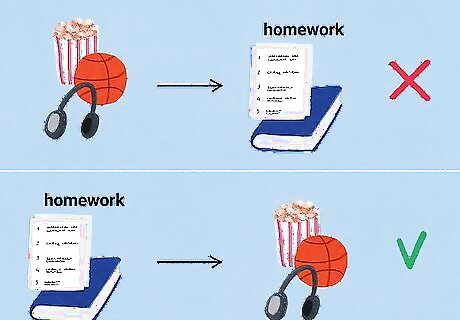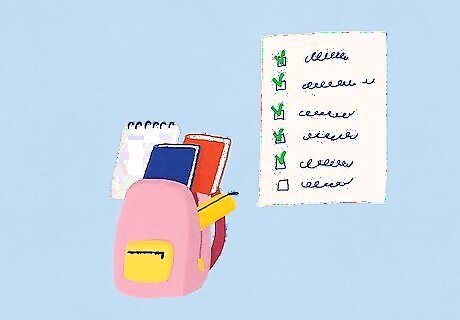
views
Wake up with your alarm.

Get up at the same time every morning. Even though you've done most of your prep work the night before, you still don't want to be rushing around in the morning. Leave yourself plenty of time to get cleaned up, get dressed, and get your things together before you have to leave. For example, if you have to catch your bus at 7:30, you might want to wake up at 6:30. This gives you an hour to get dressed, eat breakfast, wash your face, brush your teeth, and make sure you have everything you'll need for school. You might find that you don't need as much time in the morning, but be careful not to cut it too close. Ideally, you'll have time to do everything you need to do and still be calm, friendly, and social with your family before heading out. Since you went to sleep at the appropriate hour, you should feel well-rested in the morning. If you feel tired, bump your bedtime up a half-hour and see if that helps. You might have to play around with it a little until you find the right time.
Eat a good breakfast.

A balanced breakfast typically includes protein, fruit, and a vegetable. Scrambled eggs only take a few minutes to make—add spinach to get your vegetable in. If you don't have time in the morning, make them in advance. Put your eggs between 2 slices of bread, an English muffin, or a bagel, then wrap it up and put it in the fridge. All you have to do is heat it in the microwave for about 10 seconds and it'll be good to go. Stay away from sugary cereals and toaster pastries—the sugar will cause you to crash later and won't give you the focused energy you need. If your school serves breakfast, it's fine to wait until you get there to eat something. Just make sure you're starting your day with something healthy that will give you the energy you need.
Get dressed and ready.

Wash your face, brush your teeth, and comb your hair. Since you took a bath or shower last night, this should be all you need to do to look your best in the morning—and it probably won't take you more than 10 or 15 minutes. Start by putting on the clothes that you laid out last night. If you have longer hair, you might want to pull it back so it's out of your way at school or more manageable during activities. Give yourself a little extra time if you wear makeup to school or if you have other accessories you want to put on. Glance in the mirror one last time and smile—you're ready to go!
Prepare your lunch.

If you take your lunch to school with you, pack it in the evening. This gives you less to worry about in the morning. You can always put it in the fridge for the next day to keep anything from spoiling. If you're eating lunch at school, you might want to look at the lunch menu schedule so you know what your options are for the next day. If you have a choice, figure out what you want the night before so you won't have to make a decision on the spot tomorrow.
Pack your bag according to your schedule.

Include the books and supplies you'll need for the next school day. Check your schedule and put the books, supplies, and other materials you'll need for the next day in your bag. Take out anything you won't need and leave it at home. If you'll need a change of clothes for PE or another activity, make sure they're clean and ready to go along with your other school things. You might want to check the weather as well. For example, if it's supposed to rain tomorrow, you'll want to make sure you have a raincoat or umbrella ready.
Finish your homework after school.

Attack your homework before you do anything else. If you do your homework first, you won't have it hanging over your head. Once it's done, you'll know you have the rest of the evening to do whatever you want to do before bed. Getting your homework done first also means you know it's done so you won't have to stress about it in the morning. Set up a particular spot to do your homework every day. When you get home, go directly to that spot and start working.
Share any school news with your parents.

Handle permission slips or other school reports in the evening. If you have anything you brought home that your parents need to sign, show it to them around dinnertime. This gives them time to look over it and discuss it with you if they need to. If you need permission for a school event or outing, put it on your family calendar. Set reminders if you need to do anything specific to prepare.
Pack your backpack the night before.

Double-check to make sure you have everything you need. This helps you remember anything that you might have forgotten the night before. Go over your schedule and make sure you have everything you need for each of your classes that day. You might consider putting up a copy of your schedule next to the door so you can do a quick double-check right before you head out.
Take a bath or shower at night.

A warm bath or shower can help you relax and get ready for bed. You likely want to take a bath or shower at night anyway, especially if you were active during the day. Taking it 1-2 hours before you go to bed will help you get to sleep faster and have better quality sleep. A bubble bath or shower gel with a calming scent, such as lavender, also helps relax you and improve your sleep quality.
Do something relaxing before bed.

A quiet activity, such as reading a book, helps your mind calm down for sleep. For an hour or so before you go to bed, turn down the lights and do something calm and relaxing. This will get your mind and body to slow down and get ready for sleep more naturally. This works best if everybody else in your family is also engaged in relatively quiet activities so they don't disturb or distract you. If the sun is still out when you're transitioning toward bedtime, close the blinds or curtains so the natural light won't come into your room. Avoid stimulating activities, such as exercise or watching an exciting television show, right before bed. When you stimulate your mind, you'll have a harder time falling asleep and won't sleep as deeply when you finally do.
Get a good night's sleep.

Establish a bedtime routine and go to bed at the same time every night. Studies show that grade-school-age children need between 9 and 11 hours of sleep each night, while teenagers need 8 to 10 hours. Count backward from the time you need to wake up for school every morning to establish your bedtime. For example, if you're 16 years old and you need to get up at 6 a.m., that means you need to go to bed sometime between 8 p.m. and 10 p.m. If 8 p.m. sounds way too early for you to go to bed, start with a 10 p.m. bedtime. You can always adjust it if you consistently feel tired in the morning.
Time your morning routine.

See how long it takes you to get ready for school. This will help you decide when you need to set your alarm so you aren't rushing in the morning. One weekend or another day you don't have school, go through the motions as though you are getting ready for school—check the time when you're done and you'll know how much time you need each morning. For example, you might find that it takes you 30 minutes to do everything you need to do in the morning at a normal pace. Add 15 minutes to this time (just in case anything goes wrong) and set your alarm for 45 minutes before you need to leave. Don't forget to add in time to wake up as well. If it usually takes a couple of minutes for the alarm to wake you up, set it a couple of minutes earlier than you need to get up to account for that.
Prep for each week on the weekend.

Use your weekends to set yourself up for success. On Sunday, get your clothes together for each day of the week and hang them in a special place in your closet so they're ready to go. If you take your lunch to school, you can also prep your lunches for the week and keep them in the fridge. Go over your schedule for the week and take note of any special activities that might require a little extra prep work. Is there anything you can do in advance? Go ahead and get it ready so you don't have to worry about it during the week.















Comments
0 comment